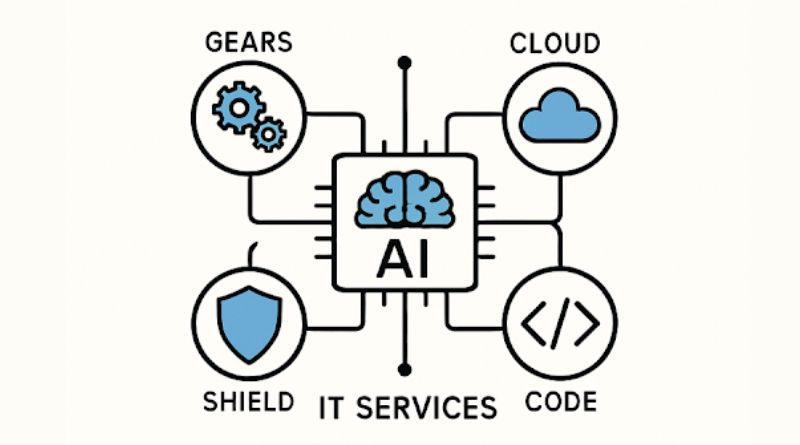How Artificial Intelligence Is Shaping the Future of IT Services
Artificial Intelligence (AI) is transforming the IT services industry, redefining how organizations manage, protect, and optimize their technology ecosystems. By automating repetitive tasks and enabling data-driven decision-making, AI has evolved from a passing trend into a powerful force reshaping every aspect of IT operations. Its impact is especially evident in data-intensive sectors such as healthcare, where healthcare legacy data management is becoming more efficient and secure through AI-driven solutions that enhance data integrity and accessibility.
Today’s digital landscape demands agility, security, and operational excellence—and AI is at the forefront of meeting these expectations. IT leaders are leveraging AI to accelerate software development, strengthen cybersecurity, and deliver smarter, more responsive support systems. As businesses modernize legacy systems and seek to elevate customer experiences, AI’s strategic role has become indispensable. Beyond immediate gains in productivity, its integration sets the foundation for long-term innovation and competitive advantage, distinguishing top-performing organizations in a rapidly evolving technological world.
AI-Powered Software Development
AI is rapidly transforming how software is developed and maintained. Advanced AI tools such as OpenAI’s Codex and GitHub Copilot now assist teams by generating error-free code snippets, accelerating development cycles, and reducing bugs. Developers are evolving from coders to orchestrators, reviewing, integrating, and customizing AI-generated outputs across backend, frontend, and integration tasks. This paradigm shift is enabling organizations to quickly deploy new applications and iterate on user feedback with remarkable agility.
Enhancing IT Operations with AI
Managing complex digital ecosystems requires innovation well beyond manual processes. Here, AI takes center stage—supercharging IT operations with intelligent automation and predictive capabilities. By leveraging AI-driven tools, businesses unlock greater efficiency, lower their operational risks, and create more sources of value by freeing human capital for higher-order initiatives.
Intelligent Automation
Traditional robotic process automation (RPA) automates repetitive, rules-based tasks. When combined with AI, RPA evolves into a tool for automating higher-complexity activities, including those involving decision-making, data synthesis, and creative logic. This integration is setting new standards for what IT operations can achieve autonomously and at scale.
Proactive Issue Resolution
One of the most promising advances in IT operations is AI’s ability to forecast and resolve incidents before they disrupt business. With real-time data analysis and pattern recognition, AI-driven platforms shift the focus from reactive firefighting to preemptive stabilization—minimizing downtime and maintaining robust system performance.
AI-Driven Customer Support
AI technologies have significantly enhanced the delivery of IT support. Advanced virtual IT assistants—powered by natural language processing (NLP)—can now resolve common user requests, troubleshoot issues, and configure systems. These assistants enable faster resolutions, decrease reliance on manual intervention, and deliver a more seamless user experience. Looking ahead, AI-powered support systems could integrate with augmented and virtual reality, transforming how users interact with support agents and digital environments.
Personalized IT Support
AI enhances personalization by learning user preferences and tailoring support based on previous interactions. This creates more effective, intuitive experiences while reducing response times. Personalized AI support systems not only boost agent productivity but can also increase user satisfaction and loyalty.
Strengthening Cybersecurity Through AI
The sophistication of cyber threats demands a faster, smarter response—one that only AI can deliver at scale. AI-driven security solutions scan vast amounts of network data to detect anomalies, uncovering and neutralizing threats that might otherwise go unnoticed. As cybercriminals leverage automation and machine learning, defending systems proactively with AI is now a strategic imperative for every organization.
AI-Driven Threat Detection
Modern cybersecurity relies on AI to identify risks in real-time, facilitating the rapid detection and remediation of advanced cyberattacks, including zero-day vulnerabilities and insider threats. This not only reduces the impact of breaches but also helps organizations comply with regulatory frameworks around data protection.
Automated Response Systems
AI-powered security systems aren’t just about detection. They also take automated action to isolate threats, restore affected systems, and correlate attack data across networks for comprehensive incident response, reducing the time and effort needed from security teams.
AI in Data Analytics and Business Intelligence
With data becoming the world’s most valuable asset, AI provides organizations with the tools to extract actionable insights from massive, diverse datasets. AI-powered analytics platforms enable businesses to interpret raw information, predict market changes, and devise informed strategies that would be impossible through manual analysis alone.
Advanced Data Processing
AI accelerates the ability to process and understand both structured and unstructured data, helping organizations visualize trends and discover new opportunities. Predictive analytics—driven by machine learning—empowers teams to optimize operations, financial planning, and customer engagement.
Personalized Analytics
AI tailors analytics and recommendations to specific users and departments, ensuring stakeholders receive the most relevant and timely intelligence for their unique needs. This customized approach enhances the impact of business intelligence solutions across the organization.
Optimizing Cloud Infrastructure with AI
The proliferation of cloud computing urges businesses to find strategies for managing resource complexity and controlling operational costs. AI-driven automation is ushering in the era of the autonomous cloud, where resources are dynamically scaled, workloads are optimized in real time, and services are delivered seamlessly across public, private, and hybrid environments.
AI in Cloud Optimization
By predicting demand and allocating resources accordingly, AI minimizes waste and unnecessary expenses. As organizations increasingly rely on cloud platforms, the ability to make data-driven adjustments is becoming an operational necessity, as highlighted in analyses by entities such as Gartner.
Moreover, AI enhances scalability by automatically adjusting workloads in response to fluctuating user demands. It also improves system reliability by identifying potential failures before they occur and suggesting proactive solutions. Ultimately, this intelligent automation empowers businesses to achieve higher performance, lower costs, and greater sustainability in their cloud operations.
Autonomous Cloud Operations
AI systems now manage cloud environments with minimal human intervention—creating, adjusting, and securing resources to match dynamic business goals. This moves organizations closer to achieving a fully self-sustaining digital infrastructure and IT operations.
Conclusion
AI is shaping the future of IT services by enabling increasingly advanced levels of automation, intelligence, and resilience. As organizations adapt to an increasingly complex landscape, embracing AI for software development, support, cybersecurity, analytics, and cloud management will be critical for sustainable growth and a lasting competitive edge. Companies that invest strategically in AI today are positioning themselves as leaders of tomorrow’s digital economy.




